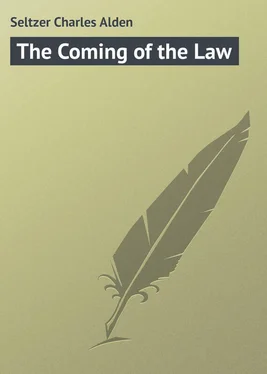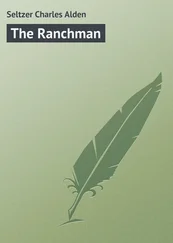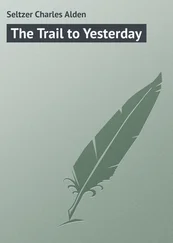Charles Seltzer - The Coming of the Law
Здесь есть возможность читать онлайн «Charles Seltzer - The Coming of the Law» — ознакомительный отрывок электронной книги совершенно бесплатно, а после прочтения отрывка купить полную версию. В некоторых случаях можно слушать аудио, скачать через торрент в формате fb2 и присутствует краткое содержание. Жанр: foreign_prose, foreign_adventure, на английском языке. Описание произведения, (предисловие) а так же отзывы посетителей доступны на портале библиотеки ЛибКат.
- Название:The Coming of the Law
- Автор:
- Жанр:
- Год:неизвестен
- ISBN:нет данных
- Рейтинг книги:5 / 5. Голосов: 1
-
Избранное:Добавить в избранное
- Отзывы:
-
Ваша оценка:
- 100
- 1
- 2
- 3
- 4
- 5
The Coming of the Law: краткое содержание, описание и аннотация
Предлагаем к чтению аннотацию, описание, краткое содержание или предисловие (зависит от того, что написал сам автор книги «The Coming of the Law»). Если вы не нашли необходимую информацию о книге — напишите в комментариях, мы постараемся отыскать её.
The Coming of the Law — читать онлайн ознакомительный отрывок
Ниже представлен текст книги, разбитый по страницам. Система сохранения места последней прочитанной страницы, позволяет с удобством читать онлайн бесплатно книгу «The Coming of the Law», без необходимости каждый раз заново искать на чём Вы остановились. Поставьте закладку, и сможете в любой момент перейти на страницу, на которой закончили чтение.
Интервал:
Закладка:
Hollis smiled. “Fire away,” he directed.
The judge leaned his elbows on the table and narrowed his eyes at Hollis. “Don’t think my questions impertinent,” he said gravely, “for I assure you that nothing is further from my mind than a desire to pry into your affairs. But I take it you will need some advice–which, of course, you may disregard if you wish. I suppose you don’t make a secret of your age?”
“No,” was the instant reply, given with a grin, “I am twenty-six.”
The judge smiled dryly. “We have great ambitions at twenty-six,” he said. “I remember that at twenty-six I was rather determined on making the Supreme bench. You can see for yourself how far I missed it. I do not say that we never realize our ambitions,” he added quickly as he saw a flash light up the young man’s eyes; “I merely wish to show that in my case they were rather extravagant.” He grimaced, continuing with a smile: “You are a college man, of course–I can see that.”
Hollis nodded. The judge continued, with an admiring glance at the young man’s muscular frame and broad shoulders.
“Went in for athletics–football, and such?” he said. “Well,” he added, catching the young man’s nod, “it didn’t hurt you a particle–it doesn’t hurt anybody. Rather prepares a man for hard knocks–which he is sure to get sooner or later. If you have decided to live in this country you must expect hard knocks. And I presume you are going to live here?”
“That depends.” returned Hollis. “If father has left his affairs in such shape that it is necessary for me to stay here and straighten them out, why of course I shall stay. Otherwise – ” He hesitated and laughed quietly, continuing: “Well, I also have an ambition, and if I am compelled to remain here it will have to be sacrificed. It is a rather humble ambition compared to yours,” he laughed. “It is journalism,” he continued, suddenly serious; “I want to own a newspaper. I am city editor now and in a few years – ” He laughed. “I am not going to prophesy, but I have been working hard.”
The judge’s eyelashes flickered, but his face remained grave. “I am afraid that you will have to remain here. That is”–he added dryly–“if you expect to realize anything from the property.”
“I expect there can’t be much property,” observed Hollis.
The judge smiled. “A thousand acres of good grass land, some buildings, and”–here the judge’s eyes gleamed and he drawled his words–“a newspaper.”
Hollis sat erect. “A newspaper!” he gasped. “A newspaper in this country? Why, man, a newspaper – ”
The judge laughed. “So you will not have to go back East in order to be able to realize your ambition–you can own a newspaper here–your father’s newspaper–the Dry Bottom Kicker . It was quite a recent venture; I believe it appeared about a dozen times–intermittently. Ostensibly it was a weekly, but in reality it was printed at those times when your father’s affliction sat least heavily upon him. He used to hire a compositor from Las Vegas to set the type,–a man named Potter–a worthless sort of fellow, but a genius in his way–when sober. I suspect that much of the matter that went into the Kicker emanated from the brain of Dave Potter.”
Hollis’s smile revealed just a trace of derision. “You don’t happen to know how father happened to think that a newspaper would pay–in this place?” he asked.
The judge looked at him meditatively, a gleam of quiet amusement in his eyes. “I don’t remember to have said that the paper made any money for your father,” he returned slowly; “nor do I remember hearing your father say that he expected it to make any money. As I understand the situation, your father founded the paper on principle. He expected to use it as a weapon.”
“Please go on,” urged Hollis. “That strikes me as a rather Quixotic proceeding.”
“It was, rather,” admitted the judge; “that is, it would seem Quixotic as viewed by an Eastern newspaper man. But out here people are apt to ignore money and methods in considering results. After you have been here a while you will be able to see the force and truth of that statement. Your father was after results and he seized upon the idea of founding a newspaper as a means by which to obtain them. And I feel certain that had he lived he would have succeeded.”
“I plead ignorance,” said Hollis, watching the judge closely. “What particular result did my father desire?”
Judge Graney’s eyes gleamed with earnestness. He leaned forward, speaking slowly and distinctly.
“I am going to illustrate my point by giving you a brief history of your father’s experiences out here–as I had it from him. He came out here about fifteen years ago and took up a quarter-section of land over on Rabbit-Ear Creek, the present site of the Circle Bar ranch. For quite a few years he was a nester–as the small owner is called in this country, but he was unmolested for the reason that there were few large owners in the vicinity and each man was willing that his neighbor should succeed. Your father prospered and after a few years began to buy land. He finally acquired a thousand acres; he told me that at one time he had about five thousand head of cattle. Of course, these cattle could not live on your father’s thousand acres, but the ranges are free and the thousand acres answered very well as a headquarters.
“Eight years ago some men in Santa Fe organized what is known as the Union County Cattlemen’s Association. This company secured a section of land adjoining your father’s property, on the other side of Rabbit-Ear Creek. The company called its ranch the Circle Cross. Perhaps it strikes you as peculiar that the Association should have chosen a brand so closely resembling your father’s. I will digress long enough to explain the action.”
The judge drew out a pencil and picked up a piece of paper that lay near him on the desk, making some crude hieroglyphics and poising his pencil above them.
“Here,” he explained, indicating a sketch which he had drawn, “is the Circle Bar brand–a bar within a circle. And this–” indicating another sketch, “–is the Circle Cross–a cross within a circle. It is of course, perfectly obvious that all the Circle Cross company had to do when it desired to appropriate one of the Circle Bar cattle was to add a vertical bar to the Circle Bar brand and the brand became the Circle Cross. From a mechanical standpoint it was a very trifling operation, the manipulator of the brands having merely to apply the hot iron through a piece of wet blanket–that gives a new brand the appearance of age.
“To get back to the main subject. The new company called its ranch the Circle Cross and it erected new buildings within a few miles of the Circle Bar buildings. Not long after the advent of the new company it tried to buy the Circle Bar, but your father refused to sell. Bill Dunlavey, the Circle Cross manager, attempted to negotiate the purchase of the Circle Bar and when he was met with refusal hard words passed between him and your father. Not long after that your father began to miss cattle–rustlers began a systematic attack upon his herds. Your father recognized this thievery as the work of the Cattlemen’s Association and he fought back.
“A number of times he changed his brands but each time the company checkmated him. To illustrate: Your father changed his brand to appear thus:” The judge drew again on the paper. “That is the ‘Wine-Glass’ brand. You can see that it resembles a wine glass when held up vertically, though of course as it appeared on the Circle Bar cattle it lay on its side. But this move was futile, for among the Circle Cross cattle now appeared many branded with the sign of the ‘Hour-Glass,’ thus:” The judge drew again. “This was achieved by merely adding a semi-circle to the wine-glass, closing over the bowl.”
Читать дальшеИнтервал:
Закладка:
Похожие книги на «The Coming of the Law»
Представляем Вашему вниманию похожие книги на «The Coming of the Law» списком для выбора. Мы отобрали схожую по названию и смыслу литературу в надежде предоставить читателям больше вариантов отыскать новые, интересные, ещё непрочитанные произведения.
Обсуждение, отзывы о книге «The Coming of the Law» и просто собственные мнения читателей. Оставьте ваши комментарии, напишите, что Вы думаете о произведении, его смысле или главных героях. Укажите что конкретно понравилось, а что нет, и почему Вы так считаете.












